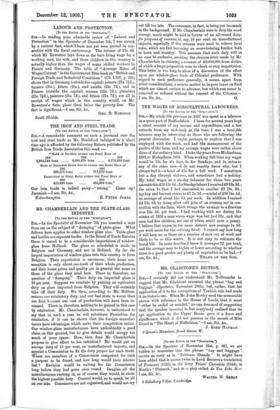MR, CHAMBERLAIN AND THE PLATE-GLASS INDUSTRY.
[To THE EDITOR OF THE "SPECTATOR."] Sul,—In the Spectator of November 7th you inserted a note from me on the subject of " dumping " of plate-glass. What follows here applies to other window-glass also. Table-glass and bottles are separate trades. In the Board of Trade Returns there is stated to be a considerable importation of window- glass from Holland. The glass so scheduled is made in Belgium and Germany, and not in Holland. By far the largest importation of window-glass into this country is from Belgium. Their exportation is enormous ; their home con- sumption is only about one-tenth of their whole production, and their home prices and quality are in general the same as those of the glass they send here. There is, therefore, no question of "dumping." Their duty on imported glass is 10 per cent. Suppose we retaliate by putting an equivalent duty on glass imported from Belgium. They will certainly take off their duty. We then, according to Mr. Balfour, remove our retaliatory duty, and our last state is worse than our first, b3cause our cost of production- will have been in- creased. There is, therefore, nothing to be gained in this case by retaliation. Mr. Chamberlain, however, is understood to say that in such a case he will substitute Protection for retaliation, if it can be shown that the foreign manufac- turers have advantages which make their competition unfair. Our window-glass manufacturers have undoubtedly a good claim on this ground, but to give details would occupy too much of your space. How, then, does Mr. Chamberlain propose to give effect to his intention? He would put an average duty of 10 per cent. on manufactured imports, and appoint a Commission to fix the duty proper for each trade. Where are members of a Commission competent for such a purpose to be found, and how long would their labours last P Revision would be waiting for the Commission long before they had gone once round. Imagine all the manufacturers rushing in, as of course they would, to claim the highest possible duty. Counsel would, so to speak, be all on one side. Consumers are not organised, and would not cry out till too late. The consumer, in fact, is being put too much in the background. If Mr. Chamberlain were to drop the word average, much might be said in favour of an all-round duty, for purposes of revenue, of, say, 10 per cent. on manufactured imports, especially if the revenue were used to relieve local rates, which are fast becoming an overwhelming burden both in town and country. This assumes that such duty will in no ease be exclusive, avoiding the obvious error made by Mr. Chamberlain in claiming a revenue of 29,000,000 from duties, of which a large proportion were to check or stop importation. This letter is too long to allow of a discussion of the effect upon our window-glass trade of Colonial preference. With regard to such preference generally, it seems, apart from other considerations, a serious matter to impose taxes on food which are almost certain to advance, but which can never lm removed or reduced without the consent of the Colonies.—


























































 Previous page
Previous page